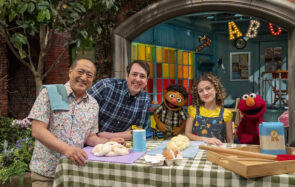My friend Anne recently posed an excellent question related to keeping the dietary laws of Passover. “For those of us who are gluten-free,” she asked, “is cutting
hametz
really a hardship?”
What Anne was getting at, I believe, is the underlying observation that it can be a challenge to get in the right frame of mind for Passover if giving up wheat and other grains is nothing new. Many of us unknowingly (or knowingly) rely on the physical aspect of our holidays to access the deeper spiritual realm where we can focus on what really matters. On Rosh Hashanah we dip apples in honey; we fast on Yom Kippur; we’re commanded to eat in a sukkah during Sukkot; we fry potatoes in oil during Hanukkah; we try new fruits on Tu Bishvat; we make a dairy meal for Shavuot; we feast throughout Shabbat. Rosh Hashanah, however, is not about apples and honey. Hanukkah is not about latkes. Shabbat is not just about pigging out.
Likewise, Passover is not about avoiding bread or experimenting with a trendy diet. Still, changing the way we eat for the week can make an impact on our ability to digest (no pun intended) the lessons of the holiday.
Although I’m not gluten-free, I’ve been attracted to the benefits of a low-gluten, low-carb, clean-eating lifestyle over the past few years, which is why Anne’s question stuck with me. If you’re already on some form of a gluten-free, quinoa-eating, or grain-free Paleo-type diet, then I think you probably do need to find other ways to experience the spiritual benefits of staying within the confines of the Passover rules.
Worry not! I have some good ideas, and none of them include eating kosher-for-Passover cereal and brownies, which may be gluten-free, but they’re certainly not healthy for your body or your mind.
Three Non-Food Related Ways to Get in the Passover Spirit
1. When you and your kids (or just you) are searching for those last bits of hametz with a feather, try to remember that you are not just crumb-searching, you are soul-searching. As you clean out those cupboards and corners of the house, take the time to think about what you can make room for in your life once the hametz is gone. Consider the strengths and talents you could bring out more this year if you made time and space for them. Help your kids identify their own strengths and encourage them to put those qualities front and center, starting with the week of Passover.
2. In preparation for hearing the Passover story and for telling the kids about God taking us out of slavery in Egypt, commit to starting the process of liberating yourself from one thing that has been “enslaving” you this year. Last year during Passover and for several months right after, I worked very hard to free myself from feeling so attached to my iPhone. I made small changes like not bringing the phone in my bedroom and not keeping it on tables during meals. Those manageable commitments added up to a true sense of freedom that has allowed me, even a year later, to stay connected, but not chained to the people and information that comes through that little intoxicating screen.
I’ve heard others discuss trying to liberate themselves from worrying about what people think. Another friend is giving up a few of the shows that keep her too dependent on the TV for entertainment. The possibilities are endless and deeply personal. Kveller has been collecting readers’ hopes for personal freedoms this year with the #WhatsYourExodus series. Check it out for some inspiration!
3. I recently learned that the word Pesach (Passover) is made up two Hebrew words. “Peh” means a mouth and “sach” means that speaks. Passover is a good time to think about more than just using our mouths to tell the Passover story, though that’s obviously important. The holiday is also an opportunity to think about the way we use words. Can we be kinder? More honest? Maybe in certain situations where our words can be biting and hurtful, could we be less honest? How can we use our mouths for good?
Any other ideas for how the gluten-free and grain-free friends and family at our seder tables can get the most out of Passover?
Like this post? Get the best of Kveller delivered straight to your inbox.







